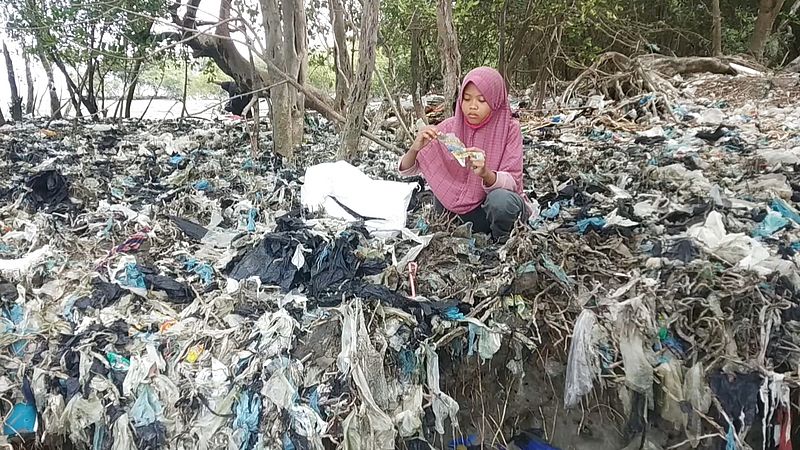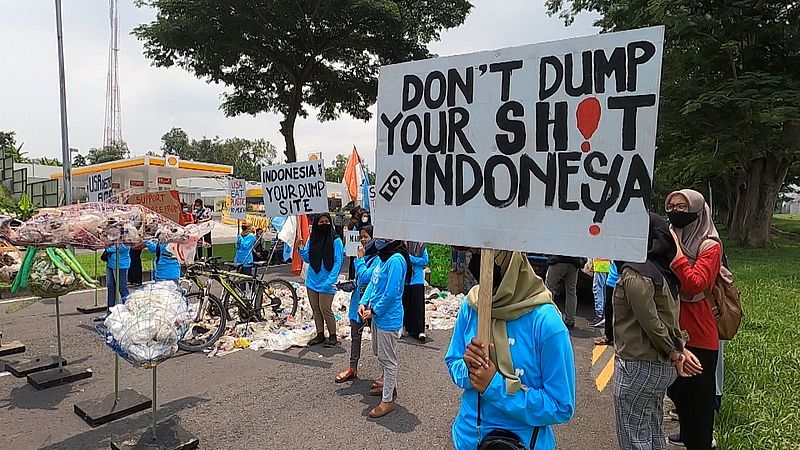The Netherlands is a champion at exporting plastic waste abroad. This is evident from new research by Plastic Soup Foundation. 70 million kilos end up in Indonesia every year. "There should be an export ban as soon as possible."
Of all the countries in the European Union (EU), the Netherlands transports the most plastic waste to countries outside it, such as Indonesia, 11,000 kilometers away.
Export ban needed
The dumping of plastic waste in countries outside the EU began in 2018, says Jurjen de Waal of Plastic Soup Foundation. "Until then, almost all plastic waste went to China." But when that started causing problems in China, the country closed its borders to plastic waste, says De Waal.
"This created a huge congestion in the system and then other countries were found to take it to, such as Indonesia. Plastic Soup Foundation wants an export ban on plastic waste to outside the EU as soon as possible. "We can't saddle people in countries like Indonesia with our problems," he said.
200 million kilos per year
Last year, the Netherlands exported over 200 million kilos of plastic waste to countries outside the European Union. Of this, almost 70 million kilos went to Indonesia and almost 64 million kilos to Vietnam. The Netherlands is also a major player worldwide, only Japan and the United States exported more plastic waste in 2021.
Albert Heijn en Jumbo
Plastic from the Netherlands, for example, ends up in the village of 15-year-old Nina Aqilani. She lives in East Java on the Brantas River, in the district of Gresik. Nina prefers to watch movies or read comic books, but most of the time she is busy cleaning up plastic, she says.
"At home I google the words on the packaging and I often come across names of Dutch stores like Albert Heijn, Jumbo, Hema and Kruidvat and brands like Verkade, Lay's and Haribo."
Recycling runs roughshod
How is it possible that there is so much export of plastic waste? That all the plastic in the Netherlands is recycled is a myth, says De Waal of Plastic Soup Foundation. "At the moment, less than 50 percent of the plastic packaging in the Netherlands is recycled," he says.
"The plastic you separate at home is neatly collected by the municipality. Then it is offered for recycling. But in practice that doesn't always go well. Sometimes the plastic waste gets mixed with other waste, or it becomes contaminated. And then it can no longer be used for recycling."
Exporting cheaper
Rejected plastic waste can go into the incinerator, but often the choice is made to export it, because that is cheaper, says De Waal.
"Then it is put on transport to a foreign country. There it should be processed further and that's how it says on the official papers, but in practice nothing comes of it."

'Our country as your dustbin'
It makes Nina Aqilani from Gresik sad, scared and angry at the same time. "You are using our country as a garbage can. That hurts me as an Indonesian. It pollutes our air, soil, river and groundwater. We may not feel the effects right now, except that it looks terrible, but in 10 years, our physical health will also be at risk."
Nina is often compared to Swedish climate activist Greta Thunberg. For in the meantime, Nina, like Thunberg, is seeking contact with leaders of countries that allow the export of plastic waste. "I would love to meet Greta. Not only because I admire her, but also because I have found quite a bit of Swedish plastic waste in my region."
'Invest in better techniques'
With the export ban, which Plastic Soup Foundation is advocating, Nina wholeheartedly agrees. "Stop dumping plastic waste in my country. Take back what you have brought. You are a rich country and have access to high technology. Why don't you invest in better recycling technologies so that more plastic can be reused?"
In Eindhoven, this is already happening. A few years ago, the company Ioniqa made an invention that allows plastic waste to be recycled endlessly. And that means less plastic waste.
Endless new plastic
"What we have done is come up with a clever means by which we can break down colored plastic to the level of molecules. So you get a very pure raw material, as pure as what we get from oil now," says director Tonnis Hooghoudt. "And with that we can make new plastic endlessly."
This process is called 'chemical recycling'. "In mechanical recycling, which is done a lot now, you melt plastic objects into something new, but each time the quality of the plastic deteriorates a bit. After 6 times of recycling, it 'runs out' and you're back to waste anyway." Chemically recycled plastic does not lose any quality, according to Hooghoudt. There is now a chemical recycling plant in Geleen and as far as the director is concerned it will become the norm.
Packaging-free
De Waal of Plastic Soup Foundation is pleased with the efforts of Hooghoudt and his people, but thinks it is even more important to reduce the use of plastic. "We have to stop wanting to pack everything in plastic. All that disposable plastic is absolutely unnecessary," he says.
"In France, since this year, it has been forbidden to package fruits and vegetables in plastic, and it's going well there. And in 2030, at least 20 percent of French stores must be equipped for 'refill' so that you, the customer, can use your own packaging. We should do that in the Netherlands too."
CC: Eenvandaag

